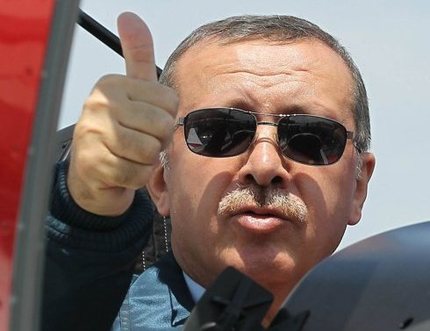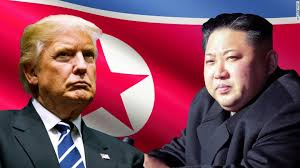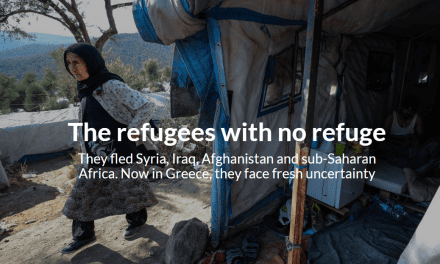Turkey warns that Ankara’s relationship with Washington has reached a ‘critical point’ that would either be ‘fixed’ or ‘totally destroyed.’ The U.S. is willing to swallow Turkey’s ‘chutzpah’ as long as it keeps away from Russia
By Zvi Bar’el, Haaretz
As legend has it, Sultan Murad IV, who was known for his brutality, in 1634 killed with a slap two janissaries who assaulted his grand vizier. The incident was the origin of the so-called Ottoman slap (Osmanli tokadi in Turkish), which Ottoman soldiers were trained to perform. Such a slap, so it was said, could crack a man’s skill and even kill a horse.
Two days after Erdogan’s “Ottoman slap” speech, U.S. Secretary of State Rex Tillerson stopped in the Turkish capital for a three-and-a-half-hour meeting with the Turkish president and foreign minister. It’s doubtful that Tillerson understood the term “Ottoman slap,” since in a departure from protocol he did not bring his own translator or aides to the meeting, relying on the translation skills of Cavusoglu. The media briefing held after the meeting did not hold out cause for optimism. The United States and Turkey agreed to establish three coordinating committees to discuss points of disagreement. The first is scheduled to convene Friday. Working groups of this kind are generally created between rival countries; allies don’t need them, they simply pick up the phone and talk. But the bad blood between Ankara and Washington is so poisoned that last week, too, Erdogan waved a warning finger at the Trump administration, saying he expected deeds and not words from the United States, as if Turkey were a superpower telling a client state how to behave.
Concurrently, the U.S. Congress is in an uproar over plans to impose sanctions on Ankara in the wake of its attitude to Washington. There has even been talk on Capitol Hill of placing visa bans on senior Turkish officials and prohibiting imports of Turkish-made handguns, which generate an estimated $100 million in annual revenue for Turkey. The proposals are anathema to the U.S. State Department, however, which believes that Turkey’s “chutzpah” notwithstanding, its cooperation is vital to America’s unfocused policy in Syria; above all, sanctions could push Turkey even closer to Russia and perhaps even lead Ankara to leave NATO.
Erdogan understands Washington’s dilemma and has kept up his assaults. Last week, after the UN Security Council passed a resolution calling for a 30-day cease-fire in Syria, mainly to help the 300,000 residents of eastern Ghouta under heavy Syrian bombardment, Erdogan declared that the resolution does not apply to Turkish military operations in the Kurdish-controlled enclave of Afrin. In response, U.S. State Department Spokesperson Heather Nauert said that she would “encourage Turkey to go back and read the UN resolution.” Erdogan apparently was just waiting for such a remark: Saying that Nauert’s comments were “baseless” and showed that she “couldn’t understand the focal point of the resolution or wants to distort it,” Turkish Foreign Ministry spokesman Hami Aksoy argues that “in Afrin, Turkey is exercising its right to self-defense based on Article 51 of the UN Charter.”
Russian-Turkish axis
But the incursion into Afrin is not only a Turkish military operation with the cynical name Operation Olive Branch, whose goal is to drive the Kurdish military forces from the Turkish-Syrian border. It confronts Washington with a difficult dilemma, forcing it to choose between its alliance with Ankara and its support for the Kurdish militias, which have proved effective against Islamic State militants. Turkey is demanding that the United States not only end its cooperation with the Kurdish units but also recover the heavy weapons it provided to them, as it supposedly promised to do after the war against Islamic State. Turkey believes it can make demands of the U.S. administration, which has yet to decide on a clear policy regarding its future presence in Syria — mainly on account of Turkey’s alliance with Russia, which for its part is using Ankara to drive out the U.S. forces. Russia, however, is also in no hurry to fully support Turkey, both because the Turkish presence in Syria will interfere with the creation of a united state-controlled by the Assad regime and because the Russians ascribe great importance to Kurdish participation in the Moscow-led political process to end the crisis in Syria. The Russian response starkly highlighted Moscow’s vacillations. It allowed Syrian President Bashar Assad to dispatch to Afrin pro-regime militias to aid the Kurds, and Russian Foreign Minister Sergey Lavrov could not have been more clear when he said last week that “Turkey’s security concerns can be met through direct dialogue between Turkey and Syria.”
Turkey, which staunchly refuses to negotiate with Assad, shrank in the face of the Russian stance. As a side in the Russian-Iranian-Turkish axis overseeing the implementation of the decision to create safe zones in Syria and a partner to the talks on the country’s future, Ankara cannot afford a head-on confrontation with Moscow. To reassure the Russians, Turkish presidential spokesman Ibrahim Kaln engaged in a bit of verbal gymnastics, saying in televised remarks last week that Turkish intelligence officials “may establish direct or indirect contact when it is required to solve certain problems under extraordinary conditions”: neither recognition of Assad nor a move to ignore him entirely. In this diplomatic tango, Russia is also making an effort not to step on Turkey’s feet. Moscow does believe the United Nations Security Council resolution includes the Turkish military operation in Afrin, but at this stage it isn’t pressuring Ankara. Last week Alexander Venediktov, the assistant to the secretary of the Russian Security Council, said that it was the United States, with its “deliveries of modern weapons and encouragement of separatist sentiments among the Kurds,” that had “provoked Turkey into carrying out the military operation in Syria’s northern Afrin region.” The language used neither places the responsibility on Erdogan nor does it offer support for the operation.
Ongoing oppression
Turkey’s actions in Syria cannot be separated from the political strategy that has guided Erdogan in recent weeks. Turks believe he will call early presidential and parliamentary elections, perhaps as soon as July, around a year and a half before their scheduled date. The speculations are fueled by his alliance with the ultranationalist opposition with the Nationalist Movement Party (MHP), led by Devlet Bahceli. Bahceli, who last week declared that he was ready to sacrifice his life in Operation Olive Branch, if necessary, needs Erdogan’s support no less than Erdogan needs the support of nationalist extremists if he is to win a majority in the election.
Erdogan seeks to exercise the numerous authorities ranted to him by the constitutional amendments that were just barely approved in an April 2017 referendum. The amendments, which include abolishing the office of prime minister and transferring its powers to the president; wide authority in choosing parliamentary candidates for his party; changes to the procedures for appointing judges and the authority to dissolve the parliament, will go into effect in the next election.
The military operation in Afrin has broad public support in Turkey, and not only among supporters of Erdogan’s Justice and Development Party. Presumably, his strong stance against the U.S. administration and the European Union member states — Erdogan has used the threat of terror attacks in Europe by members of Islamic State in the event Turkey were to loosen its borders — have contributed to his popularity, Erdogan, whose government continues to arrest dozens of citizens every week for suspected involvement in the failed coup of July 2016 and acts to destroy the pro-Kurdish party, is not particularly impressed by international reprimands over its human-rights abuses.
Prominent authors and journalists Ahmet Altan, Mehmet Altan and Nazl Ilcak were sentenced to life in prison; seven Kurdish lawmakers were expelled from the Turkish parliament; Selahattin Demirtas, a leader of the pro-Kurdish party, has been in jail for 18 months without trial; the state broadcaster has banned due to their content 208 Turkish and Kurdish pop songs, many of them performed by well-known singers for years; all this, in addition to the ongoing persecution of newspapers and other media outlets.
Erdogan backed down in only one instance, when German Chancellor Angela Merkel threatened to cancel a deal to upgrade Turkey’s Leopard tanks if Turkey did not release Deniz Yucel, a German-Turkish journalist who was arrested over a year ago. Yucel was charged with involvement in terror, but his real offense was insulting the regime. He was released in mid-February and returned to Germany.
Andrew Brunson, a Christian pastor from North Carolina, has not been so lucky. He was arrested in October 2016, suspected on involvement in the failed coup. Erdogan has said he is willing to trade Brunson in exchange for the extradition of Fethullah Gulen, the U.S.-based Muslim cleric that Erdogan says was behind the coup attempt. It would seem that Merkel is willing to do much more for her citizens than Trump; either that, or she is clearer and more precise in her threats. In any event, Turkey’s domestic front, excited over the army’s actions in Syria, is ready for early elections that will give Erdogan a period of rule equal to that of Ataturk.



















